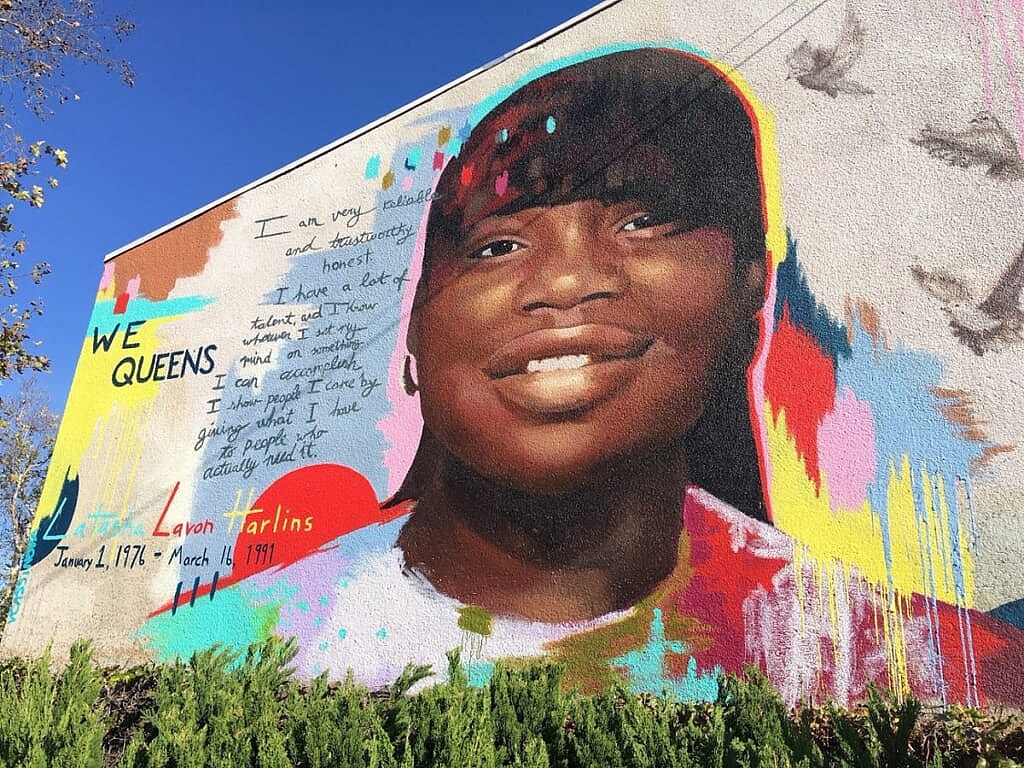Latasha Harlins was trying to buy orange juice for her family when she was shot and killed by a Korean convenience store owner.
Read More: FEMA names Los Angeles county as most dangerous area in America
Harlins was 15-years-old in 1991 when she died instantly after being shot at the time by 51-year-old, Soon Ja Du, who accused her of attempting to steal the juice.
Now 30 years later, a mural honoring the South-Central L.A. teenager’s life has surfaced at the Algin Sutton Recreation Center in Los Angeles.
“The people in [this] neighborhood don’t know who Latasha was because these are new generations,” said her cousin, Shinese Harlins Kilgore, over the phone to The LA Times.
“So now is our time to speak up so we won’t forget her name.”

Read More: California man arrested with pipe bombs may have targeted Newsom
The teenager put the juice in her bag, but witnesses saw her walking around the store with the money to pay for it. The store owner accused her of trying to steal and assaulted her.
Harlins and the store owner exchanged a few words, and the owner grabbed Latasha’s sweater. After she struck the lady to break free from her grasp, Latasha put the juice on the counter and attempted to leave the store. That is when the store owner shot her in the back of the head.
At the time, police said Harlins had “no attempt of shoplifting.”
Du was charged and found guilty of manslaughter. However, the judge on the case, Joyce Karlin, sentenced Du with only probation because she claimed the store owner was acting out of fear of being robbed in the past.
She was ordered to pay a $500 fine and sentenced to 400 hours of community service.
“For a long time, I couldn’t look at her picture,” said Harlins’ 79-year-old grandmother who raised her, Ruth Harlins.
“But now, I have [them] up,” she said. Now when she looks at the photos, she tells herself, “That’s my granddaughter. I miss her.”
The killing of Harlins helped spark the 1992 L.A. Riots, an uprising that occurred in the city in response to injustices against Black Americans.
Netflix also recently published a documentary about Harlins’ life called “A Love Song for Latasha.”
“This community can now begin to heal,” said Tybie O’Bard, a friend of Latasha’s. “It shouldn’t have taken 30 years, but we’re here, and she’s here to stay.”
Visual artist Victoria Cassinova created the mural over the rec center where Latasha spent most of her time growing up. Harlins is seen smiling brightly alongside the words “We Queens,” a phrase she would use often.
Christina Acoff Rogers, Latasha’s sister said her memory will not be forgotten, per ABC 7.
“We will lead, and we will make sure that her name is not forgotten and the truth about Latasha Harlins.”
Have you subscribed to theGrio’s podcast “Dear Culture”? Download our newest episodes now!
TheGrio is now on Apple TV, Amazon Fire, and Roku. Download theGrio today!

